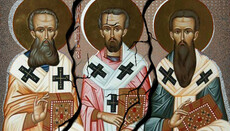The power of Christian faith: Humility as the chief virtue

What is the true value of our faith?
The soul is created for Heaven, for eternal life, for God. It is like a plain that may become a cultivated field or a steppe overgrown with weeds. Each of us remembers the joy that comes when we look upon a well-kept field. It delights the eye and evokes respect for the person whose labor turned a bare patch of land into soil fit for grain and fruit. But when we see a neglected, untended field, we feel sorrow and pity for the farmer who ceased to work his lot.
The plain of the soul lies entirely within our care. Whether it will yield fruit or lie fallow depends solely on us.
A field that is plowed and sown brings forth abundant harvest. Yet amid the ears of wheat, one may overlook a single small weed. It grows, drops its seeds, and before we realize it, the entire field is covered in thorns. The hardier weeds soon choke the cultivated plants and seize dominion over the steppe expanse.
Christ, when preaching of the Kingdom of Heaven, spoke to people well acquainted with the toil of the farmer. His comparison remains useful for us, though we rarely know the hardships of rural life. We admire the beauty of a tended field and wish likewise to behold the beauty of a soul tilled with virtue. Yet often we fail, for behind our outward piety we overlook the weeds of sin sprouting within. We do not see them because outward show often prevails over inner goodness.
The Apostle Paul’s thorn in the flesh
The Apostle Paul warned his readers against such self-deception. He understood that pagans who embraced Christianity might grow proud of their new status and exchange true faith in God for the fleeting esteem of men. By his own example, Paul showed that every divine revelation is pure mercy, not a reward for supposed merit.
“It is not expedient for me to glory,” he writes humbly (2 Corinthians 12:1), and tells a wondrous story of “a man in Christ” who was once caught up into Paradise and “heard unspeakable words, which it is not lawful for a man to utter” (2 Corinthians 12:4).
Paul strives to distance himself as much as possible from this man, holding him up as an example to others – though he is speaking, in truth, of himself and his own mystical experience. It was he whom the Lord, in His providence, deemed worthy to behold divine glory at the dawn of his apostleship.
God lifted Paul to the invisible heights of knowledge – and at the same time taught him not to exalt himself for that revelation. “And lest I should be exalted above measure through the abundance of revelations, there was given to me a thorn in the flesh, the messenger of Satan to buffet me, lest I should be exalted above measure” (2 Corinthians 12:7).
We cannot know precisely what tormented the Apostle: perhaps an illness, some bodily affliction, or a burning of the flesh. Yet this “thorn” served as a constant reminder that he was not almighty, not an angel without body, but a frail and sinful man.
Sorrows as a path to God
The closer one draws to the ideal of Christian life, the more trials God permits. These trials teach responsibility for the spiritual gifts received. And when, like Paul, we complain of the weight of temptations, the Lord gently answers: “My grace is sufficient for thee, for My strength is made perfect in weakness” (2 Corinthians 12:9).
Strange as it may sound, the heavier our cross, the nearer God is to us.
Throughout Christian history, saints lived amid deprivations, sickness, and grief. Holiness is no earthly reward but a heavenly crown. To become a saint, to draw near to God, one must be prepared for the world to rise against him – to become alien to it. The flesh will torment us, people will despise us.
But each time we humbly fall to our knees in prayer, we will feel that the Father is near – that He comforts us and fills the soul with inexpressible joy. In this lies the wondrous strength of Christian faith: “We are troubled on every side, yet not distressed; we are perplexed, but not in despair; persecuted, but not forsaken; cast down, but not destroyed” (2 Corinthians 4:8–9).
Hell will spare only the humble
Every day of life, God sends us a lesson in humility.
One contemporary elder of Mount Athos once said something astonishing: there will be many righteous people in hell. There will be bishops, priests, monks, and devout laymen who lived within the Church and performed countless good deeds.
These words seem terrifying – how can one devote an entire life to Christ and still end up in hell? Is God so cruel to us?
After a pause, the elder said: “Hell will spare only the humble.”
Here lies the root of all Christianity – the very power that raised Christ upon the Cross for the salvation of the world, the chief virtue we are called to inherit from our Savior.
The Lord will not ask us about our deeds, but about how humble we were.
If we gain humility, our spiritual life will be utterly transformed for the better. Then the words of Blessed Diadochos of Photike will be fulfilled in us:
“To God, because of His greatness, belongs glory;
to man, humility – that through it we may become God’s own.”











